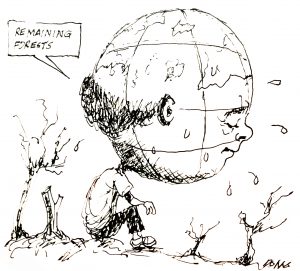Forests act as carbon sinks, and, through photosynthesis, absorb carbon dioxide from the atmosphere. When forests are destroyed, the carbon stored in them is released back into the atmosphere as carbon dioxide, leading to an increase in greenhouse gas emissions, which contribute to global warming and climate change. Additionally, deforestation affects rainfall patterns, which can lead to droughts or flooding, and affects the stability of ecosystems.
Another impact of depleted forest covers is the loss of biodiversity. Forests are home to millions of species of plants and animals, some of which are rare and endangered. Deforestation destroys these habitats, putting many wildlife species in danger of extinction. Moreover, the degradation of forested areas affects the balance of the ecosystem, leading to changes in fauna, flora, and soil fertility. Forests also provide essential ecosystem services, such as soil conservation, water regulation, and nutrient cycling. Losing forests’ services can affect not only natural systems, but also people’s lives and livelihoods, especially those who depend on forests for food, fuel, and medicine.
The loss of forests contributes to the degradation of the soil, leading to soil erosion and desertification. Soil erosion is caused by the removal of trees and plant roots, which hold the soil together. As a result, the topsoil is washed away, making it impossible for crops to grow and harming the land’s productivity. Desertification occurs when land degrades to the extent that it becomes a desert. This phenomenon affects approximately 10% of the world’s land surface and has severe consequences for people who live in these areas.
Indeed, the depletion of forest covers has severe consequences, including climate change, loss of biodiversity, soil degradation, and desertification. The long-term effects of deforestation can be catastrophic, impacting not only natural systems but also people’s lives and livelihoods. Mitigating these impacts requires collective efforts from all stakeholders, including governments, NGOs, the private sector, and local communities.
Reversing the loss of forested areas requires more than just planting trees; it requires a holistic approach that addresses the root causes of deforestation, such as unsustainable agriculture, illegal logging, and mining, among others.




